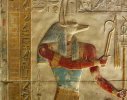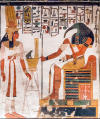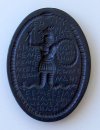- Sep 10, 2021
- 6,296
- 5,442
Leaving The Ways Of Egypt Behind, To Walk In The Fear Of God, Part 1

The fear of God came upon the Israelites during the Exodus. Numerous plagues gripped the entire nation of Egypt, and culminated in the deaths of all the first born in that nation as the Israelites prepared to leave. As Pharaoh pursued them, the entire army he brought with him was killed by supernatural means. And then when the Israelites got to Mt. Sinai, the fire of God was so strong upon the mountain that they were too terrified to approach it, even when Moses told them to.
These events were the beginning of their sojourn out of Egypt, and the apostle Peter now began drawing parallels between what the New Testament church was going through and what they had. The early church too was now "sojourning" to their own promised land, and likewise needed to fear God. They needed to "gird up their loins" and prepare to depart from their past, for theirs was the true God, and like on Mt. Sinai the Lord Jesus Christ would be manifesting Himself in Power soon.
13 Wherefore gird up the loins of your mind, be sober, and hope to the end for the grace that is to be brought unto you at the revelation of Jesus Christ; 14 As obedient children, not fashioning yourselves according to the former lusts in your ignorance. 15 But as He which hath called you is Holy, so be you Holy in all manner of conduct, 16 because it is written, "Be holy, for I am Holy." 17 And if you call on the Father, who without respect of persons judges according to every man's work, then pass the time of your sojourning here in fear. (1 Peter 1:13-17)
As during the Exodus from Egypt, some were distancing themselves "from their former lusts in their ignorance," but others were not, and the Golden Calf incident was a prophetic warning of what could happen if some Christians gave themselves to fleshly lusts like eating, drinking, "playing" (sex, promiscuity), and potentially to the worship other gods; demonic ones, such as those the Gnostic "Christians" worshipped. This is why Paul drew the same parallels to give similar warnings:
1 Moreover, brethren, I do not want you to be unaware that all our fathers were under the cloud, all passed through the sea, 2 all were baptized into Moses in the cloud and in the sea, 3 all ate the same spiritual food, 4 and all drank the same spiritual drink. For they drank of that spiritual Rock that followed them, and that Rock was Christ. 5 But with most of them God was not well pleased, for their bodies were scattered in the wilderness. 6 Now these things became our examples, to the intent that we should not lust after evil things just as they also lusted. 7 And do not become idolaters as were some of them. As it is written, “The people sat down to eat and drink, and rose up to play.” 8 Nor let us commit sexual immorality, as some of them did, and in one day twenty-three thousand fell. 9 Neither should we put the Lord to the test, as some of them tested Him, and were being destroyed by serpents. 10 Neither let us murmur as some of them also murmured, and perished by the destroyer. 11 And these things happened to them as examples, and they were written for our admonition, upon whom the end of the ages has come. 12 Therefore let him who thinks he stands take heed lest he fall. (1 Corinthians 10:1-12)
This was the reason they needed to fear God just like the Israelites did. He was jealous God, and He would not accept them worshipping demonic spirits. The Passover Lamb which represented Him had to die for the Israelites to be redeemed out of slavery in Egypt, just as Christ had to die to redeem the saints out of Hades when He rose from the dead and led captivity captive. To give themselves back into slavery and bondage to the very evil spirits He redeemed them from would be an insult to His love and His character. Peter now continued in this same vein by saying:
18 Forasmuch as ye know that ye were not redeemed from your vain conduct received by tradition from your fathers with corruptible things such as silver and gold, 19 but with the precious blood of Christ, as of a lamb without blemish and without spot, 20 Who truly was foreordained before the foundation of the world, but was manifest in these last times for you, 21 who by Him do believe in God, Who raised Him up from the dead and gave Him glory, that your faith and hope might be in God. (1 Peter 1:17-21)
As we shall see, the fear of God was just as real during New Testament times as it was during the time of the Exodus, so the parallels were more fitting than most Christians today realize.
The Demonic Gods Of Egypt
After several hundred years on Egypt, many of the "gods" the Israelites were familiar with were little more than unclean spirits. The number of these half-animal, half-human "gods" depicted on Egyptian wall murals was too numerous to count, but to show just a few, the following is an image of Wepwawet, the god associated with war who supposedly guided spirits through the underworld.

In later Egyptian art, Wepwawet was depicted as a wolf or a jackal, or as a man with the head of a wolf or a jackal. Even when considered a jackal, Wepwawet usually was shown with grey, or white fur, reflecting his lupine origins. He was depicted dressed as a soldier, as well as carrying other military equipment—a mace and a bow. Over time, the connection to war, and thus to death, led to Wepwawet also being seen as one who "opened the ways" to and through Duat for the spirits of the dead. (Wepwawet Brother to Anpu,EgyptianOccultHistory.Blogspot.com)
Such demons also taught the practice of witchcraft, as one article states:
In Ancient Egypt, magic was invoked through deities, primarily by trained priests, but also by pharaohs, magicians, and ordinary people. It was an integral part of healing rituals and was brought into being using spells and sacred texts. The most prominent use of magic was as protection against evil, illness, disease, and danger, whether it be a snake bite, a life-threatening illness, or an invading army... It could also be harmful [when used] as a curse or black magic. Objects were also believed to be charged with magic, including amulets and wands. (Magic in the Ancient World: Egyptian Deities and Uses. TheCollector.Com)
Thoth, for instance, was highly regarded as the god of hidden wisdom and became the keeper of magic secrets, and was often depicted as being approached by humans on such matters.

According to the eyewitness testimony of a former Baptist minister named Harold Pittman, there were five specific orders of demons that were pointed out to him as playing a key role in bringing in the end of the age, the third most important of these being those involved in inciting men to occultism, heresy and false religion:
Demons from the third order appeared to be part man - part animal, resembling figures from Greek mythology… This group possessed skills in the area of the black arts, such as sorcery, false religion, magic, self-destruction, psychic phenomenon, the occult, necromancy, Satan worship, and all the other related areas of expertise. (Pittman, Demons: An Eyewitness Account, P.34, 35)
Lest anyone doubt the parallels with Satanism here, Amun-Re, who at one point came to be regarded as "the king of the gods," was the forerunner to "the Goat of Mendes," a symbol used by Satanists to this day to represent the observance of their religion in practice.
According to Pittman's account, the lowest yet most numerous class of demons was charged with corrupting mankind sexually. No surprise then that the "gods" of Egypt also taught the Egyptians to practice ritual sexual uncleanness, including sex with animals said to represent the gods. This then relates to what shall be covered more in Part 2, that the golden calf was simply a heavy borrowing from Egyptian practice, and when scripture says "they ate and drank, and rose up to play," they were simply gravitating in the same immoral directions as the Egyptians had.
Thus the creation of the Golden Calf represented a return to the worship of the evil deities of Egypt, and it is in part why the New Testament writers made use of the Old Testament teaching, "Touch not the unclean thing and I will receive you." The God of the Bible would have nothing to do with the worship of unclean and evil spirits.

The fear of God came upon the Israelites during the Exodus. Numerous plagues gripped the entire nation of Egypt, and culminated in the deaths of all the first born in that nation as the Israelites prepared to leave. As Pharaoh pursued them, the entire army he brought with him was killed by supernatural means. And then when the Israelites got to Mt. Sinai, the fire of God was so strong upon the mountain that they were too terrified to approach it, even when Moses told them to.
These events were the beginning of their sojourn out of Egypt, and the apostle Peter now began drawing parallels between what the New Testament church was going through and what they had. The early church too was now "sojourning" to their own promised land, and likewise needed to fear God. They needed to "gird up their loins" and prepare to depart from their past, for theirs was the true God, and like on Mt. Sinai the Lord Jesus Christ would be manifesting Himself in Power soon.
13 Wherefore gird up the loins of your mind, be sober, and hope to the end for the grace that is to be brought unto you at the revelation of Jesus Christ; 14 As obedient children, not fashioning yourselves according to the former lusts in your ignorance. 15 But as He which hath called you is Holy, so be you Holy in all manner of conduct, 16 because it is written, "Be holy, for I am Holy." 17 And if you call on the Father, who without respect of persons judges according to every man's work, then pass the time of your sojourning here in fear. (1 Peter 1:13-17)
As during the Exodus from Egypt, some were distancing themselves "from their former lusts in their ignorance," but others were not, and the Golden Calf incident was a prophetic warning of what could happen if some Christians gave themselves to fleshly lusts like eating, drinking, "playing" (sex, promiscuity), and potentially to the worship other gods; demonic ones, such as those the Gnostic "Christians" worshipped. This is why Paul drew the same parallels to give similar warnings:
1 Moreover, brethren, I do not want you to be unaware that all our fathers were under the cloud, all passed through the sea, 2 all were baptized into Moses in the cloud and in the sea, 3 all ate the same spiritual food, 4 and all drank the same spiritual drink. For they drank of that spiritual Rock that followed them, and that Rock was Christ. 5 But with most of them God was not well pleased, for their bodies were scattered in the wilderness. 6 Now these things became our examples, to the intent that we should not lust after evil things just as they also lusted. 7 And do not become idolaters as were some of them. As it is written, “The people sat down to eat and drink, and rose up to play.” 8 Nor let us commit sexual immorality, as some of them did, and in one day twenty-three thousand fell. 9 Neither should we put the Lord to the test, as some of them tested Him, and were being destroyed by serpents. 10 Neither let us murmur as some of them also murmured, and perished by the destroyer. 11 And these things happened to them as examples, and they were written for our admonition, upon whom the end of the ages has come. 12 Therefore let him who thinks he stands take heed lest he fall. (1 Corinthians 10:1-12)
This was the reason they needed to fear God just like the Israelites did. He was jealous God, and He would not accept them worshipping demonic spirits. The Passover Lamb which represented Him had to die for the Israelites to be redeemed out of slavery in Egypt, just as Christ had to die to redeem the saints out of Hades when He rose from the dead and led captivity captive. To give themselves back into slavery and bondage to the very evil spirits He redeemed them from would be an insult to His love and His character. Peter now continued in this same vein by saying:
18 Forasmuch as ye know that ye were not redeemed from your vain conduct received by tradition from your fathers with corruptible things such as silver and gold, 19 but with the precious blood of Christ, as of a lamb without blemish and without spot, 20 Who truly was foreordained before the foundation of the world, but was manifest in these last times for you, 21 who by Him do believe in God, Who raised Him up from the dead and gave Him glory, that your faith and hope might be in God. (1 Peter 1:17-21)
As we shall see, the fear of God was just as real during New Testament times as it was during the time of the Exodus, so the parallels were more fitting than most Christians today realize.
The Demonic Gods Of Egypt
After several hundred years on Egypt, many of the "gods" the Israelites were familiar with were little more than unclean spirits. The number of these half-animal, half-human "gods" depicted on Egyptian wall murals was too numerous to count, but to show just a few, the following is an image of Wepwawet, the god associated with war who supposedly guided spirits through the underworld.

In later Egyptian art, Wepwawet was depicted as a wolf or a jackal, or as a man with the head of a wolf or a jackal. Even when considered a jackal, Wepwawet usually was shown with grey, or white fur, reflecting his lupine origins. He was depicted dressed as a soldier, as well as carrying other military equipment—a mace and a bow. Over time, the connection to war, and thus to death, led to Wepwawet also being seen as one who "opened the ways" to and through Duat for the spirits of the dead. (Wepwawet Brother to Anpu,EgyptianOccultHistory.Blogspot.com)
Such demons also taught the practice of witchcraft, as one article states:
In Ancient Egypt, magic was invoked through deities, primarily by trained priests, but also by pharaohs, magicians, and ordinary people. It was an integral part of healing rituals and was brought into being using spells and sacred texts. The most prominent use of magic was as protection against evil, illness, disease, and danger, whether it be a snake bite, a life-threatening illness, or an invading army... It could also be harmful [when used] as a curse or black magic. Objects were also believed to be charged with magic, including amulets and wands. (Magic in the Ancient World: Egyptian Deities and Uses. TheCollector.Com)
Thoth, for instance, was highly regarded as the god of hidden wisdom and became the keeper of magic secrets, and was often depicted as being approached by humans on such matters.

According to the eyewitness testimony of a former Baptist minister named Harold Pittman, there were five specific orders of demons that were pointed out to him as playing a key role in bringing in the end of the age, the third most important of these being those involved in inciting men to occultism, heresy and false religion:
Demons from the third order appeared to be part man - part animal, resembling figures from Greek mythology… This group possessed skills in the area of the black arts, such as sorcery, false religion, magic, self-destruction, psychic phenomenon, the occult, necromancy, Satan worship, and all the other related areas of expertise. (Pittman, Demons: An Eyewitness Account, P.34, 35)
Lest anyone doubt the parallels with Satanism here, Amun-Re, who at one point came to be regarded as "the king of the gods," was the forerunner to "the Goat of Mendes," a symbol used by Satanists to this day to represent the observance of their religion in practice.
According to Pittman's account, the lowest yet most numerous class of demons was charged with corrupting mankind sexually. No surprise then that the "gods" of Egypt also taught the Egyptians to practice ritual sexual uncleanness, including sex with animals said to represent the gods. This then relates to what shall be covered more in Part 2, that the golden calf was simply a heavy borrowing from Egyptian practice, and when scripture says "they ate and drank, and rose up to play," they were simply gravitating in the same immoral directions as the Egyptians had.
Thus the creation of the Golden Calf represented a return to the worship of the evil deities of Egypt, and it is in part why the New Testament writers made use of the Old Testament teaching, "Touch not the unclean thing and I will receive you." The God of the Bible would have nothing to do with the worship of unclean and evil spirits.








